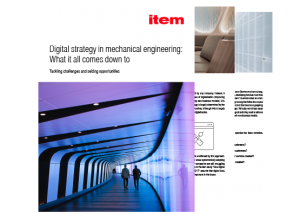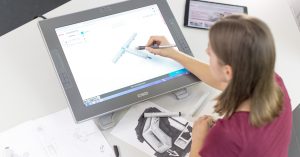As the digital transformation pushes forward, countless areas of industry are changing – including many standard processes.
How is the specialist mechanical engineering sector – which has always focused on customisation – responding to this development? To find out more, we met up with Joachim Wollmann, who is responsible for engineering and manufacturing at TK – Metallbau GmbH, and Steffen Leischnig, Managing Director of LSA GmbH, for this blog post. Their views offer valuable insights into a tradition-steeped sector that is in the midst of radical change. Their opinions on the role of digitalisation in specialist mechanical engineering paint a complex picture. Wollmann underlines the importance of digitalisation, but also believes that “many solutions are not sufficiently customised for specialist mechanical engineering”. Leischnig, meanwhile, thinks “there are still major shortcomings in terms of industry standards, safety technology, record keeping and, above all, know-how”. Although he believes digitalisation is of great strategic importance, he sees various shortcomings with regard to operations and planning.

Digital strategy in mechanical engineering
How do you actually implement digital transformation? And what in particular do mechanical engineering companies need to watch out for? Our white paper provides the ideal introduction to get you started.
GET YOUR COPY NOW
Internal process optimisation in the spotlight
As we’re sure you have heard, digitalisation in a business context can mean two different things. On the one hand, it’s about enhancing internal company processes. On the other, it’s about adapting or even reinventing business models. When it comes to digitalisation in specialist mechanical engineering, the optimisation of internal processes is unquestionably the top priority today. Using web conferencing tools and, above all, collaboration platforms has become second nature, and digital workflows centred around the relevant ‘single source of truth’ (i.e. the database utilised by all staff) don’t pose a challenge, but have instead become completely normal in the shaping of business processes. When it comes to actually rolling out mechanical engineering projects, extensive variation in the implementation quality and functional scope of digital components plays a major role. “Trial and error is particularly important for more complex tasks. You simply have to test the relevant tools out. In our eyes, LSA is a kind of early adopter in this regard. We are also in the fortunate position of being able to implement a great deal ourselves, which means we’re not reliant on system suppliers,” says Leischnig.
Ultimately, we write our own tools because we find we often need to create a very specific solution.
At TK Metallbau, digitalisation efforts are also currently geared towards internal processes, more specifically towards the end-to-end execution of orders. Since the software available on the market is too expensive and fails to satisfy the special requirements of customer projects, the company has taken matters into its own hands. “Ultimately, we write our own tools because we find we often need to create a very specific solution,” says Wollmann. He believes larger companies have the upper hand when it comes to adapting business models. “Given their resources, they have the opportunity to stand out from market competitors by offering better customer service.”
Get-up-and-go mentality for digitalisation in specialist mechanical engineering
“I actually believe you should simply try things out, such as completely eliminating paper drawings, just to determine how you could process an order from start to finish without printing a single sheet of paper, what you would need to do, and where the problems lie,” Wollmann continues. In general, he recommends using a straightforward project to test out new workflows and technologies. In this context, it’s a good idea to bring close customers on board and ask them whether they would be interested in the new development. That way, you can quickly determine whether there is market interest. Leischnig would tend to agree: “You can certainly sketch out your vision. That way, you’ve definitely got something to aim for. After that, however, you should quickly start focusing on small elements. And if you’ve got a large specialist mechanical engineering project, why not simply treat your customer to one of those elements as a taste of what’s to come?”
Think big, start small, move fast – live by that motto and you’ll be well prepared for the future.
This approach can be summed up with the motto “Think big, start small, move fast”. Digitalisation in specialist mechanical engineering is about advancing towards an ambitious goal – but in an ongoing, agile process. If, on top of that, you involve core customers early on, a win-win situation emerges for both parties, as Leischnig points out: “The solution might well be relevant for the customer’s other machines.” Given the countless opportunities that digitalisation offers mechanical engineering companies, the trial-and-error method is, in any event, the only practicable solution. “This is absolutely vital. You can envisage a great deal in your head, but you really have to try things out for yourself if you want to achieve a breakthrough,” sums up Wollmann.
Interested in digitalisation and what the future holds for industry? Then we have something that’s right up your street! Simply subscribe to the item blog by completing the box at the top right.





